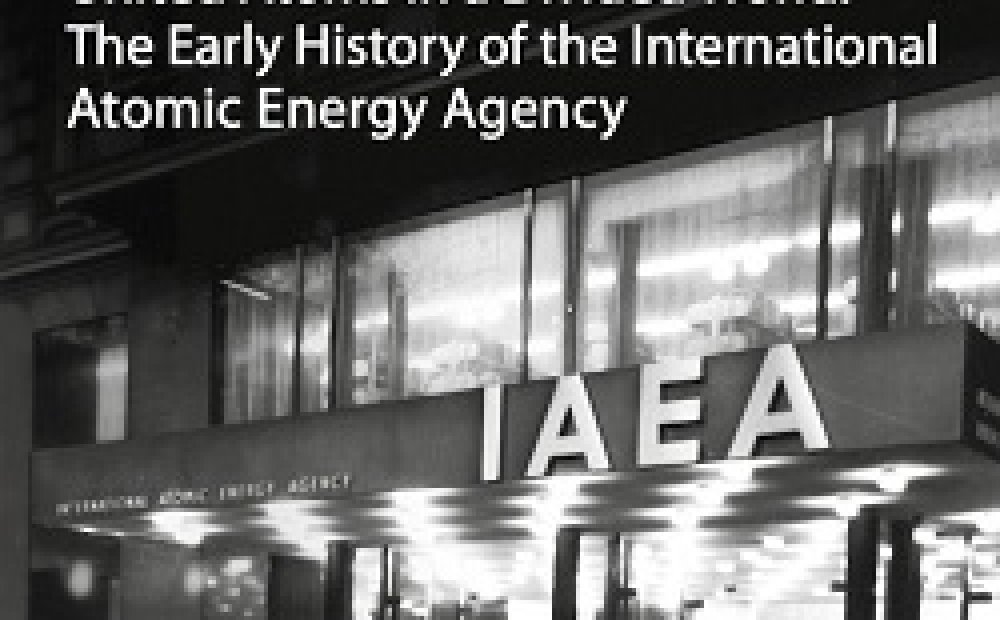OFF-SITE CONFERENCE: United Atoms in a Divided World: The Early History of the International Atomic Energy Agency

The Department of Contemporary History at the University of Vienna in collaboration with the Wilson Center's Nuclear Proliferation International History Project will host an international conference entitled, United Atoms in a Divided World: The Early History of the International Atomic Energy Agency on the history of the IAEA during the cold war years. The conference will cover a wide range of issues, including the creation of the Agency, its role in the nuclear non-proliferation regime, and the Agency's technical programs. Beyond that, the conference seeks to discuss the cultural, societal, and economic context of the IAEA's early history.
United Atoms in a Divided World will be held off-site at the University of Vienna from 16-18 Septmeber 2012. Visit the Univeristy of Vienna's website to download the conference program and for for full event details.
Conference Agenda
Sunday, 16 September 2012
19:30
Film Presentation: The Beginnings of the IAEA in Vienna (Metro Kino)
(Curated and introduced by Leopold Kammerhofer and Marta Riess, IAEA Archives)
Monday, 17 September 2012
10:00 – 12:30
Panel 1: The Early Years of International Nuclear Cooperation
The Soviet Union and the Peaceful Uses of Atomic Energy: The Beginnings of International Control
David Holloway (Stanford)
The Third Nuclear Power: The UK and the Creation of the IAEA
Stephen Twigge (Kew)
From New York to Vienna: The IAEA Headquarters in Austria
Elisabeth Röhrlich (Vienna)
Euratom and the IAEA: The Problem of Self-Inspection
John Krige (Atlanta)
Chair: Christian Ostermann (Wilson Center)
14:30 – 17:00
Panel 2: The IAEA and the Nuclear Non-Proliferation Regime
China and the Nuclear Non-Proliferation Regime, 1964–1989
Xin Zhan (Changchun)
The Indian Nuclear Program
A. Vinod Kumar (New Delhi)
The South African Nuclear Program and the IAEA
Jo-Ansie van Wyk (Pretoria)
The Peaceful Nuclear Explosion Debates
Robert Anderson (Vancouver)
Chair: Leopoldo Nuti (Rome)
17:30 – 19:30
Podium Discussion (in cooperation with DER STANDARD)
with Helmut Rauch (Atominstitut, TU Vienna); Joseph F. Pilat (Los Alamos National Laboratories); Gudrun Harrer (DER STANDARD, Vienna)
Chair: Oliver Rathkolb (Vienna)
Tuesday, 18 September 2012
9:00 – 11:00
Panel 3: Grass-Roots Movements, Environmentalism, and the IAEA
The Politics of Security: Protests against Nuclear Weapons and International Relations in the 1950s and early 1960s
Holger Nehring (Sheffield)
The Question of Nuclear Safety and the Rise of Environmentalism in Western Europe: Transnational Perspectives
Jan-Henrik Meyer (Aarhus)
The IAEA and the Debate on the Health Effects of Chernobyl
Karena Kalmbach (Florence)
Chair: Bernd Greiner (Hamburg)
12:00 – 14:00
Panel 4: Promoting the Peaceful Applications of Nuclear Technology
Imagined Modernity. Nuclear Power and West German Society in the 1960s
Gabriele Metzler (Berlin)
"La domestication de l’atome c’est le steak grillé avec l‘énergie nucléaire“ – Nuclear Optimism in European Newsreels
Eugen Pfister (Vienna)
Three Mile Island: The First Great Nuclear Power Crisis
J. Samuel Walker (Washington)
Chair: Carola Sachse (Vienna)
14:00 – 15:00
Concluding Remarks
Oliver Rathkolb and Elisabeth Röhrlich
Contact Elisabeth Röhrlich at elisabeth.roehrlich@univie.ac.at for questions and more information.
Speaker

Hosted By

Nuclear Proliferation International History Project
The Nuclear Proliferation International History Project is a global network of individuals and institutions engaged in the study of international nuclear history through archival documents, oral history interviews, and other empirical sources. Read more


History and Public Policy Program
A leader in making key foreign policy records accessible and fostering informed scholarship, analysis, and discussion on international affairs, past and present. Read more
